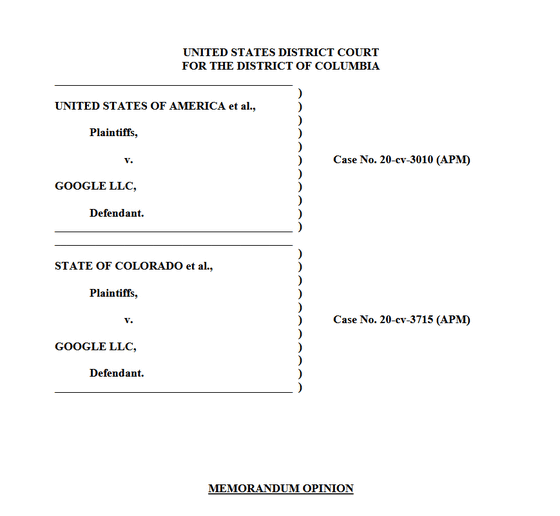Five reasons why Apple refused to adopt Microsoft Bing as the default search engine for Safari

On August 5, 2024, the District of Columbia U.S. District Court ruled that 'Google effectively shuts out rival search engines due to its massive size, high capital costs, and control of major distribution channels,' acknowledging Google's antitrust violations. In its ruling, the court determined that the contract between Google and Apple played a key role in maintaining Google's monopoly position, and summarized why Apple did not adopt Microsoft Bing, a rival engine to Google.
UNITED STATES DISTRICT COURT FOR THE DISTRICT OF COLUMBIA Case 1:20-cv-03010-APM
(PDF file)

'There's no price Microsoft could ever offer': 5 reasons Apple refused to put Bing on Safari | Mashable
https://mashable.com/article/apple-on-bing-antitrust-case
Apple devices such as iPhones, iPads, and Macs come with Safari, Apple's browser, as standard, and Safari uses Google as its default search engine. In return for this contract, Google pays Apple a certain percentage of advertising revenue earned through Safari and Chrome. In 2022, this payment is estimated to have reached $20 billion (about 2.9 trillion yen).
Apple receives 3 trillion yen a year from Google as 'fees for adopting Google search' - GIGAZINE

The ruling also noted that Apple hadconsidered making other search engines, such as Bing, the default but ultimately decided against it.
The ruling gives five main reasons why Apple did not adopt Bing:
1. Bing search quality
Apple conducted a benchmark study of Google and Bing in 2021, and concluded that while Bing had a better desktop user interface, Google outperformed Bing in all other areas, including relevance, speed, and coverage of search results. Eddy Cue, Apple's senior vice president of services, testified that 'the benchmark results determined that Bing's search quality was inferior to Google's.'

2. Bing advertising revenue
Microsoft even mentioned to Apple that it was willing to give 100% of its advertising revenue to Apple. However, because Bing's ad monetization capabilities are significantly inferior to Google's, the actual revenue was expected to be lower than the contract with Google. According to Apple's analysis, if the contract with Google were to continue, it would be expected to generate approximately $40 billion (approximately 6.6 trillion yen) in revenue over five years, while Microsoft's proposal predicted it would only be around $20 billion.
The ruling argues that Apple has an incentive to keep Google as the default search engine in Safari because Google has superior brand recognition. 'We wanted our customers to know that Google's search engine is a great product for our customers and that it's available in Safari,' Cue said.
3. Business risk
For Apple, which had already set Google as the default search engine for Safari, switching from Google to Bing entailed a big risk. Changing the Google search experience that users are accustomed to could lead to a decline in user satisfaction. There were also concerns that a decline in search quality could negatively affect sales of Apple products such as the iPhone. In addition, it seems likely that Apple also considered the risk of damaging its long-standing cooperative relationship with Google.

4. Financial loss
According to Apple's internal analysis, switching to Bing would have resulted in a revenue loss of approximately $10 billion over the first five years. This is thought to be a comprehensive projection that includes not only direct revenue from search, but also the potential impact on product sales. This loss was too large for Apple's business and was a major obstacle from a financial perspective.
5. Long-term uncertainty
The deal with Google provided Apple with long-term revenue stability. On the other hand, the switch to Bing has many uncertainties, including the trend of the search engine market, the future growth and improvement of Bing, and user response, which could bring long-term revenue uncertainty. For Apple, the risk of exchanging a stable revenue source for an uncertain option seems too great.
'The only time Apple would end its partnership with Google would be if it decided it didn't want to do business with Google anymore,' Cue said. 'Because our partnership with Google is almost certain, we've never seriously considered any other deal.'

In his ruling, Judge Amit Mehta of the U.S. District Court for the District of Columbia stated, 'AI may one day fundamentally change search, but not anytime soon. At present, AI cannot replace the fundamental building blocks of search, such as web crawling, indexing, and ranking. It is still uncertain how AI technology will transform the search market, and we will need to closely monitor future developments.' He acknowledged that AI technology has the potential to have a major impact on the search market, but indicated that for now, traditional search technology and user data remain extremely important.
Related Posts:
in Software, Web Service, Posted by log1i_yk






